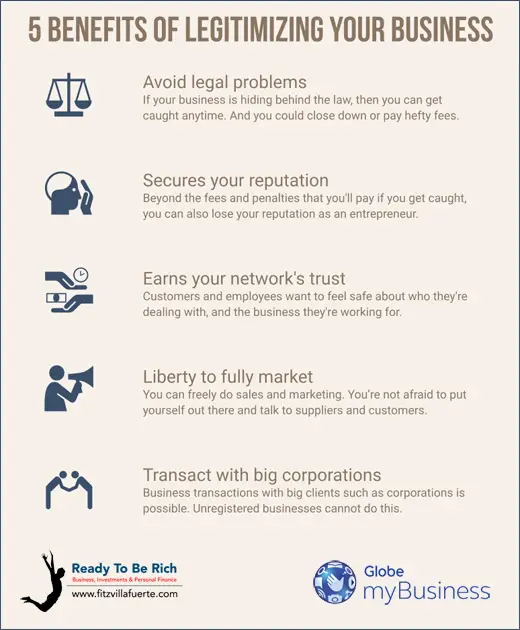Are you considering registering a business in Jamaica? Are you curious about the advantages of doing so? Whether you’re an entrepreneur or an investor, this blog post will provide insight into the benefits of registering a business in Jamaica. Read on to learn more!
Understanding the Benefits of Registering a Business in Jamaica

Understanding the Benefits of Registering a Business in Jamaica can be extremely beneficial for entrepreneurs. By registering their business, entrepreneurs are able to make it a legal entity and attract funding and other forms of support.
There are several benefits associated with registering your company or business. These include being listed on the Companies Office of Jamaica website, gaining access to urban renewal bonds, establishing business bank accounts, and having proof that the business is registered with the state. Additionally, overseas companies may operate in Jamaica but must first be registered at the Companies Office of Jamaica to do so.
Furthermore, registering a business gives it legal status which makes it easier to obtain government and private funding, as well as access other incentives such as tax breaks. Lastly, registering with the economy’s largest business city does not qualify for any special benefits or investment incentives but still provides businesses with 100% domestic ownership rights.
Legal Entity Status
Legal entity status is a crucial step in the formation of a business. It allows the entity to be recognized as its own distinct legal entity with certain rights and responsibilities. This legal entity status also gives companies certain advantages such as protection from personal liability, access to credit and financing, and taxation benefits.
When registering your business as a legal entity, you are required to provide information about the company, such as its registered name, address, contact information, type of business structure (LLC or corporation), and other relevant details. Depending on the jurisdiction in which you register your business, additional requirements may apply.
Once a business is legally established it can enter into contracts in its own name and will be liable for any debts or obligations incurred by the company itself (rather than those of individual owners). This important distinction between separate legal entities shields owners from personal liability for any actions taken by the company itself.
Additionally, with this status comes access to credit and financial institutions that may not have been available without it. Without registration however these institutions can be hesitant to lend money or provide services due to potential liabilities associated with unregistered businesses.
Finally, having a separate legal identity can help reduce tax liabilities for businesses as well as their owners because income earned by an LLC or corporation is subject to corporate taxes instead of individual taxes. This means that income from investments is taxed separately at lower rates than those imposed on individuals who earn similar amounts of money through personal investments or wages.
In conclusion, registering your business as a legal entity has many advantages that make it worthwhile for entrepreneurs looking to establish their own businesses. With this status comes protection from personal liability for actions taken by the company itself along with access to
Access to Loans and Grants
One of the most significant benefits of registering a business in Jamaica is the access to loans and grants. The Jamaica Business Fund (JBF) grant program, supported by the Development Bank of Jamaica, the Government of Jamaica, and the World Bank, provides businesses with grants for business support services. Additionally, entrepreneurs can also benefit from a JBF grant if their business belongs to a supply chain based group of locally registered enterprises transacting value added activities.
The Jamaica National Small Business Loan (JNSBL) BizBoost Loans are designed for SMEs engaged in value added activities to acquire fixed assets (except real estate). These loans provide businesses with capital to start operations or expand existing ones. Furthermore, entrepreneurs can also access other forms of assistance such as Vouchers for Technical Assistance Grants which help them meet their technical needs.
In conclusion, registering a business in Jamaica provides entrepreneurs with access to numerous grants and loan programs that can help them capitalize their businesses and obtain financial assistance they may need.
Tax Incentives

Tax incentives are a great way to reduce your business’ tax burden and increase profitability. Tax incentives are special privileges or deductions granted by the government in order to encourage certain activities, such as investing in new enterprises, creating jobs, expanding businesses, or developing certain industries. These incentives can be in the form of tax credits, deductions, exemptions, deferrals or other forms of relief.
The Urban Renewal Act provides income tax relief for investors in designated areas. Investors may receive relief from income tax on rental income and interest earned from investments made within these designated areas. This incentive is designed to promote economic growth by encouraging investment in Jamaica’s urban centers.
Jamaica also has an Omnibus Incentive Legislation that allows companies to benefit from certain fiscal benefits without having their businesses registered with the Companies Office of Jamaica (COJ). This is beneficial for entrepreneurs who want to keep their costs low while still taking advantage of all the benefits associated with operating a formal business entity.
Registering your business with COJ provides numerous benefits, including access to loans and grants, contracts and bank accounts in your company’s name as well as establishing ownership of your business’ name and inspiring customer confidence. By registering your company you will be able to take advantage of all the available government programs and support that help make running a successful business easier and more profitable.
Ease of Doing Business
Ease of Doing Business, or EODB, is an important measure for countries to assess how friendly their business and investment environments are. It looks at the regulations and procedures that businesses must go through in order to start up, operate and close down. The ease of doing business score is ranked from 0-100, with higher scores indicating more business-friendly conditions. The World Bank issues a report each year that ranks countries according to their ease of doing business score.
Ease of doing business is measured by looking at ten separate criteria: starting a business, dealing with construction permits, getting electricity, registering property, getting credit, protecting minority investors, paying taxes, trading across borders, enforcing contracts and resolving insolvency. Each individual criterion has its own set of indicators which measure different factors such as time taken to complete procedures or cost involved.
A country’s ease of doing business score reflects the overall effectiveness of its regulatory environment in promoting economic growth. Countries that have higher scores tend to attract more foreign investments due to their better investment climates. They also tend to have lower unemployment rates as businesses are able to operate more efficiently under the streamlined regulations and procedures.
Ease of doing business is highly important for governments as it affects the performance of their economies both in terms of attracting investments and creating jobs for citizens. Governments often implement reforms in order to improve their rankings on the World Bank’s report – this includes streamlining bureaucracy processes or introducing new laws that reduce red tape for businesses operating within their borders.
Company Registration Process

Company registration is the process of formally registering a business in Jamaica. This involves obtaining a name search and reservation, filing legal documents with the Companies Office of Jamaica (COJ), and paying all related fees. Once a company is registered, it becomes an official legal entity in Jamaica, which allows it to access certain benefits such as access to government contracts, tax incentives, and urban renewal bonds.
Also Read: What are the requirements to register a business in Jamaica?
The first step of registering a company is to obtain a name search and reservation from the COJ. This involves searching their database for any existing names that are similar to yours, and then reserving the chosen name so that no one else can use it. The cost for this is $500 for the Name Search and $3000 for Name Reservation.
After this is done, you must then file all necessary documents with the COJ in order to register your business legally. These include articles of incorporation or association with its articles of agreement; memorandum of association; statement by directors; list of shareholders; copies of resolutions passed by directors/shareholders; appointment letter of the directors/secretary; copy of identity cards/passports/driver’s license; returns on allotment or transfer shares; minutes book etc. All relevant forms can be found on the website of Companies Office Jamaica (www.coj.gov). After filing these documents you must pay all related fees including stamp duty fees which depend on share capital structure as well as annual return fees which must be paid every year after registration.
Once your company has been registered officially, you will receive various benefits such as being able to open a bank account in your company’s name, having access to government contracts, receiving tax incentives from both local and international
Setting Up a Bank Account

Setting up a bank account is a necessary step for any business, large or small. A business bank account helps separate your business from your personal finances, allowing you to track your income and expenses more easily and accurately. It also allows you to accept payments from customers, pay suppliers and manage cash flow.
The first step in setting up a business bank account is deciding which one is right for your company. Generally, business accounts come with higher fees than personal accounts and may offer additional features such as merchant services and cash management tools. When choosing an account, consider the types of transactions you will be making regularly and whether or not the account offers any special benefits that will help you save money or make managing finances easier.
Once you’ve selected an account, most banks require that you submit an application form along with various documents such as proof of identity and address, Articles of Incorporation (if applicable), financial statements and proof of ownership of the company (if applicable). Once all required documents are submitted, the bank should be able to set up the bank account within a few days or weeks depending on its policy.
Once the bank has set up your new business bank account, it’s important to begin tracking all transactions made through it immediately so that no money is lost or unaccounted for. It’s also important to remember that many banks require regular deposits into the new account in order to keep it active; most banks have minimum balance requirements in order for them to remain open.
Obtaining a Trade License
A trade license is an official document issued by a government or other regulatory body that authorizes a business to operate within a certain geographical area. The license may be required for any type of business, from a small street-side vendor to large manufacturing operations. Trade licenses are usually renewed annually and can be revoked if the business fails to comply with applicable laws or regulations.
Obtaining a trade license is often the first step in setting up a new business. Depending on the type of business, there may be additional requirements such as inspections, taxes and fees, or paperwork that must be completed before the license is issued. In some cases, businesses may also need to obtain additional permits or licenses for specific activities such as selling alcohol or preparing food for sale.
The process of obtaining a trade license varies from jurisdiction to jurisdiction, but generally includes submitting an application along with any necessary documents and fees. It’s important to check the local laws and regulations governing your particular type of business before applying for a trade license, as failure to comply could result in costly fines or even closure of your business.
Availability of Skilled Labour Force
Jamaica is home to an educated and skilled English-speaking workforce, which makes it a great place to register a business. The availability of skilled labour force is one of the major benefits of registering a business in Jamaica.
The challenge facing Jamaica is to develop the economy through positioning itself in the global market so that it can increase productivity, while forging links with other countries. To ensure that the workforce is vibrant, employers contribute money towards training their employees and providing them with necessary skills.
Additionally, there are several government-sponsored education and training institutions which provide technical education graduates and professionals with degrees or diplomas needed for certain professions. With these available resources, businesses can easily find employees who have the required skills to succeed in their business ventures.
Furthermore, most people in Jamaica speak an interesting dialect or patois which may be useful when dealing with customers from different backgrounds. All these factors make registering a business in Jamaica beneficial for entrepreneurs and investors alike.
Protection of Intellectual Property Rights

Intellectual Property Rights (IPR) are the legal rights to which authors, inventors, and creators of original works of art and literature are entitled. IPRs provide protection to creators by granting them a set of exclusive rights over their creations. These rights give creators the ability to control how their works are used and allow them to benefit financially from the sale or use of their work. In Jamaica, the Jamaica Intellectual Property Office (JIPO) is responsible for administering and protecting these rights.
The most common forms of IPRs include copyright, trademarks, patents, industrial designs, and trade secrets. Copyright is the exclusive right to reproduce or adapt an original work in any way without permission from its creator. Trademarks give exclusive rights to commercially use words or symbols that identify a product or service. Patents protect inventions by giving inventors exclusive commercial exploitation rights for a limited period time. Industrial designs protect ornamental features that make up the appearance of a product or item. Finally, trade secrets protect confidential information related to a business like formulas or processes that must remain secret in order for them to maintain their value in the market place.
In order to ensure that these IPRs are protected it is important for businesses and creators alike in Jamaica to register with JIPO so they can take advantage of all available protections under law. This will ensure that they have all necessary evidence should they ever need it if someone tries infringing on their intellectual property rights. Furthermore, registering with JIPO also makes it easier for companies and individuals looking to do business with each other as both parties can be assured that no one else has rights over any ideas being shared between them.
All in all, Protection of Intellectual Property
Access to International Markets
Doing business in Jamaica gives businesses access to a vast international market, allowing them to tap into the potential of a wide range of customers and suppliers. Jamaica is located in the Caribbean, and has strong economic ties with many countries around the world, including Canada, the United States, and Europe. This makes it an ideal location for companies looking to expand their reach beyond traditional markets.
Jamaica’s close proximity to North America offers businesses easy access to both regional customers as well as those from further abroad. The country also has free trade agreements with many nations, providing additional opportunities for companies interested in establishing or expanding their presence in international markets.
Thanks to its well-developed infrastructure and efficient financial systems, Jamaica provides businesses with reliable support services they can rely on while trading overseas. This includes well-maintained roads and highways that make it easy for companies to transport goods from port cities like Kingston and Montego Bay; airports that facilitate travel between countries; established banking systems; credit bureaus; secured transactions laws; and more.
In addition, Jamaica’s membership in the Economic Partnership Agreement (EPA) gives UK companies preferential access over competitors from countries without such an agreement. Furthermore, foreign exchange regulations ensure that investors can easily access foreign exchange or remit investments without any problems or delays.
All these factors combine to make Jamaica an attractive place for doing business internationally – giving businesses the opportunity to take advantage of a variety of resources available within its borders while still having access to global markets.
Incentive Programs for Investors & Entrepreneurs
Incentive programs for investors and entrepreneurs in Jamaica provide a suite of fiscal benefits to make it attractive to invest in the country. These incentives are based on transparent and automatic frameworks that take into account sector alignment, business mentor support, urban renewal bonds and duty-free importation. Companies operating in Jamaica can benefit from relief on import duties, which is applied at two stages – initial entry of goods and raw materials and subsequent re-import of finished products. Additionally, microcredit companies are registered and regulated to provide financing to micro, small and medium sized businesses. By registering a company in Jamaica, entrepreneurs can access these incentives while also ensuring their businesses become legal entities with access to funding sources.
Government Support and Assistance
The Government of Jamaica is committed to helping businesses succeed. To this end, they provide a variety of support and assistance programs designed to facilitate the growth and development of micro, small, and medium-sized enterprises (MSMEs). These programs provide access to funding, training and business advice, access to markets, as well as tax breaks for businesses.
Government grants are available through several government entities such as the Jamaica Business Fund (JBF), the Development Bank of Jamaica (DBJ), and the Small Business Association (SBA). The JBF provides interest-free loans up to $14 million for qualifying MSMEs while the DBJ offers loans up to $50 million with preferential interest rates. The SBA also provides grants up to $500 000 for certain projects.
In addition, access to market opportunities is facilitated by initiatives such as SERVE Jamaica which hosts an online marketplace featuring products from local MSMEs. The Companies Office of Jamaica also provides registration services which give businesses legal status that makes it much easier for them obtain government contracts or apply for financing from banks or credit unions.
Finally, there are numerous tax incentives available that reduce the cost of doing business in Jamaica such as duty free concessions on raw materials used in production processes; special income tax treatment for start-ups; reduced electricity rates; waivers on stamp duties; exemptions from property taxes; and payroll tax relief for new hires among others.
Overall, there are many government support and assistance programs available that can assist businesses in becoming successful in Jamaica.
Conclusion
Registering your business in Jamaica is a great way to start or expand your business. The process is straightforward and the cost of registering is relatively low. Plus, the benefits are plentiful: you can access financing, raise equity capital, and gain access to incentives such as tax breaks and investment opportunities. With the right paperwork in place, a Certificate of Incorporation can be issued within four working days. If you’re looking for a place to start or grow your business, registering in Jamaica may be the answer for you.
